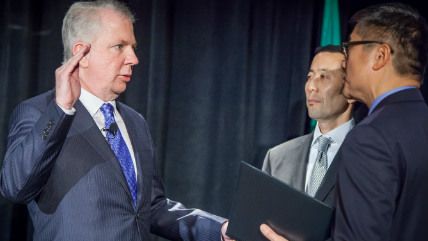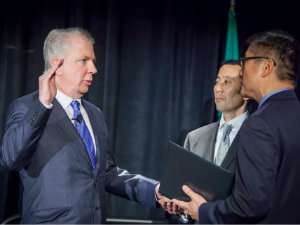Seattle Mayor Proposes Soda Tax To Fight White Privilege
A similar tax was roundly rejected in Santa Fe this week.


Determined to silence local critics who have suggested he isn't America's most progressive mayor, Seattle's Ed Murray has packed so much conflicted social justice into a simple soda tax no one in the Emerald City is quite sure what to make of it.
After it was suggested to him his proposed two-cents-an-ounce tax on soda sweetened with sugar would be borne disproportionately by the poor and people of color, Murray lowered the levy and included all sweetened drinks, incuding diet soda.
If it doesn't doesn't explode from the sheer weight of its daffy intentions, the City Council is expected to consider the proposal sometime in June.
Diet drinks, Hizzoner reasoned, were more likely to be consumed by "upper middle class white people." It had become for him "an issue of equity," a way to tackle "white privileged institutionalized racism."
Huh?
Murray had originally proposed the soda tax during his state of the city address in February. He said he hoped to raise $16 million in its first year to fund everything from an additional year of early public education to subsidies for food stamp recipients to shop at farmers' markets.
The rationale, as it has been in other cities silly enough to consider such taxes, was to"dramatically reduce the consumption of these unhealthy products" as an attack on health problems, primarily obesity, in Seattle.
The tax, Murray said, would pay the second dividend in better educations and economic opportunity. "Healthy kids get better educations and are more likely to have a brighter future," Murray said.
Then came the detractors and all their talk of a regressive tax falling disproportionally on low income and minority Seattle residents. "You know what is really regressive," a defiant Murray asked at an April 27 press conference. "You know what is really taking money out of African American communities? Tolerating an educational system that is failing kids of color everyday, leaving them without a future, and giving them food that will only lead to health problems."
While confusing these pristine motives with a diet soda tax on privileged whites, Murray was still unable to stop mau-mauing beverage makers, accusing them of adopting tobacco industry tactics targeting communities of color with a product "that only undermines the health of young people."
The people of Santa Fe were apparently unwilling to endure all of this false posturing, roundly rejecting a soda tax referendum Tuesday. City leaders had also dangled educational services funding for lower income families as a sweetener, so to speak. Fifty eight percent of voters rejected it. Voters in lower income districts voted most heavily against it.
The supposed elitism of the tax turned many voters off, as did the financial intervention of billionaire Michael Bloomberg who donated $1 million in favor of the soda tax. One anti-tax activist told the Albuquerque Journal after the election that the city should try taxing tofu instead.
Murray's case for a soda tax won't be helped by the disastrous results from cities that have gone ahead with these kinds of soda taxes.
As Reason has reported, Philadelphia's soda tax—which went into effect in January—has seen price hikes of 30 to 50 percent along with job losses in the beverage industry. Philly.com has reported that one of the city's largest drink distributors said it will cut 20 percent of its workforce, while an owner of several ShopRite stores said he will cut some 300 jobs.
Similarly situated businesses and residents in Seattle are already pushing back on Murray's proposed soda tax.
The local Teamsters Union has already come out against it with their Secretary-Treasurer saying that his union "will not support a tax that will put hardworking middle-class Americans out of a job, no matter how well-intentioned the tax may be."
Local business owners have pushed back as well. One burger joint in the city put up a sign reading "Hey Mr. Mayor, $5 sodas? Your pop tax sucks!"
Slightly more polished sentiments were echoed by Lewis Rudd—CEO of Ezells Fried Chicken, a Seattle area chain—in a press release put out by anti-soda tax group Keep Seattle Livable For All.
"Why would our City Council want to proceed with a massive tax on our diverse small business community and our city's low-income families? There has to be a better way to raise revenue than hurting our most vulnerable residents and business people," his statement reads.
Whether this opposition will be enough remains to be seen. Seattle's mayor and its city council—which contains a registered Socialist—are notoriously tax happy, and the glittering promise of an extra $18 million in revenue per year may be enough to ignore the mounting opposition.
But if the experience of Santa Fe or Philadelphia are any indication, the problems inherent in these kinds of soda taxes will not go disappear, regardless of how the city council votes.
Rent Free is a weekly newsletter from Christian Britschgi on urbanism and the fight for less regulation, more housing, more property rights, and more freedom in America's cities.


Show Comments (53)